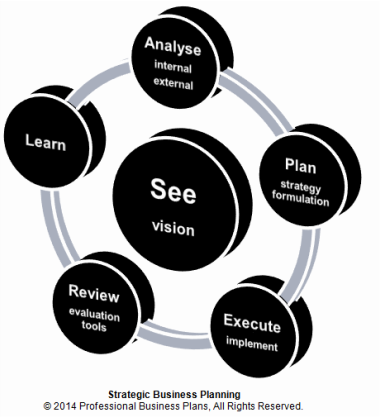An effective strategic business planning process

Strategic business planning is normally undertaken by established businesses with the purpose of providing focus, identifying or re-defining the long-term goals, and moving the business from where it is now to where it wants to be. A strategic business plan is a high-level organisational document outlining the company’s vision and mission, long-term goals and objectives, and rational and implementable strategies to achieve it. An effective strategic business plan should promote strategic thinking and be a dynamic yet visionary document, regularly reviewed and referred to.
An effective strategic business planning process involves four crucial stages: review and analysis of the business internal environment, review and analysis of the business external environment, strategy choice and formulation, and development of a sound strategy implementation plan supported by evaluation tools for subsequent review and control:
Analysis of the internal business environment
The internal environment analysis involves identification of the company’s existing business strategy, its stakeholders and their expectations, and the strategic capabilities, as well as measurement of the current performance.
The purpose of this exercise is identify and document the company’s current and desired position, the strengths and weaknesses, and to create a platform for an effective strategy choice and formulation.
Analysis of the external business environment
The external environment analysis studies various aspects of the remote environment impacting on the industry’s growth and also the forces affecting the industry’s profitability, the markets within the industry, the key customers and the major competitors.
The purpose of this exercise is to identify opportunities and threats presented by the factors outside of the company’s control, and how the company can take advantage of this knowledge given its capabilities and aspirations.
Business strategy formulation
Strategy formulation process involves identifying any gaps and inconsistencies between the existing strategies and the internal and external environments, and devising strategies to close the gaps. The chosen strategic options should then be evaluated for consistency, and undergo a detailed risk assessment.
Business strategy implementation
A brilliant strategy without an implementation plan is worthless. An effective business strategy implementation plan and relevant tools for its effective execution and subsequent review and evaluation are crucial. The tool set may include:
Julia Podgorbunskaya, CPA, Head Planner at Professional Business Plans
March 2015
(61) 02 4295 0079
[email protected]
www.ProfessionalBusinessPlans.com.au
An effective strategic business planning process involves four crucial stages: review and analysis of the business internal environment, review and analysis of the business external environment, strategy choice and formulation, and development of a sound strategy implementation plan supported by evaluation tools for subsequent review and control:
Analysis of the internal business environment
The internal environment analysis involves identification of the company’s existing business strategy, its stakeholders and their expectations, and the strategic capabilities, as well as measurement of the current performance.
The purpose of this exercise is identify and document the company’s current and desired position, the strengths and weaknesses, and to create a platform for an effective strategy choice and formulation.
Analysis of the external business environment
The external environment analysis studies various aspects of the remote environment impacting on the industry’s growth and also the forces affecting the industry’s profitability, the markets within the industry, the key customers and the major competitors.
The purpose of this exercise is to identify opportunities and threats presented by the factors outside of the company’s control, and how the company can take advantage of this knowledge given its capabilities and aspirations.
Business strategy formulation
Strategy formulation process involves identifying any gaps and inconsistencies between the existing strategies and the internal and external environments, and devising strategies to close the gaps. The chosen strategic options should then be evaluated for consistency, and undergo a detailed risk assessment.
Business strategy implementation
A brilliant strategy without an implementation plan is worthless. An effective business strategy implementation plan and relevant tools for its effective execution and subsequent review and evaluation are crucial. The tool set may include:
- Internal processes Alignment Model
- Strategy Map and related Strategy Scorecards with cascading measures
- Strategy linked company budgets and forecasts including detailed Sales, Cash Flow and Profit & Loss accounts
- Effective strategy communication tool
Julia Podgorbunskaya, CPA, Head Planner at Professional Business Plans
March 2015
(61) 02 4295 0079
[email protected]
www.ProfessionalBusinessPlans.com.au

